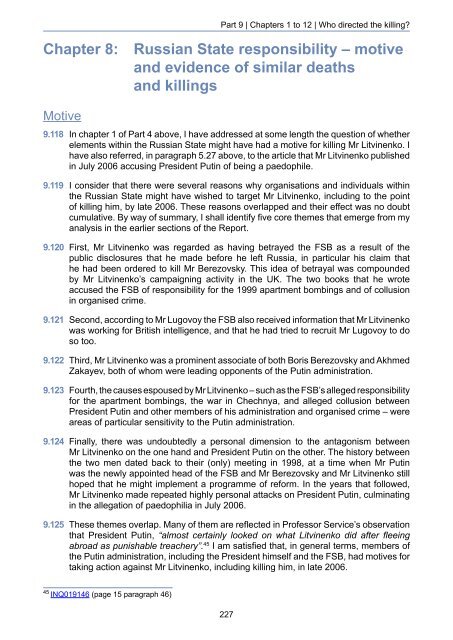The Litvinenko Inquiry
JIEp7Zyr
JIEp7Zyr
You also want an ePaper? Increase the reach of your titles
YUMPU automatically turns print PDFs into web optimized ePapers that Google loves.
Part 9 | Chapters 1 to 12 | Who directed the killing?<br />
Chapter 8: Russian State responsibility – motive<br />
and evidence of similar deaths<br />
and killings<br />
Motive<br />
9.118 In chapter 1 of Part 4 above, I have addressed at some length the question of whether<br />
elements within the Russian State might have had a motive for killing Mr <strong>Litvinenko</strong>. I<br />
have also referred, in paragraph 5.27 above, to the article that Mr <strong>Litvinenko</strong> published<br />
in July 2006 accusing President Putin of being a paedophile.<br />
9.119 I consider that there were several reasons why organisations and individuals within<br />
the Russian State might have wished to target Mr <strong>Litvinenko</strong>, including to the point<br />
of killing him, by late 2006. <strong>The</strong>se reasons overlapped and their effect was no doubt<br />
cumulative. By way of summary, I shall identify five core themes that emerge from my<br />
analysis in the earlier sections of the Report.<br />
9.120 First, Mr <strong>Litvinenko</strong> was regarded as having betrayed the FSB as a result of the<br />
public disclosures that he made before he left Russia, in particular his claim that<br />
he had been ordered to kill Mr Berezovsky. This idea of betrayal was compounded<br />
by Mr <strong>Litvinenko</strong>’s campaigning activity in the UK. <strong>The</strong> two books that he wrote<br />
accused the FSB of responsibility for the 1999 apartment bombings and of collusion<br />
in organised crime.<br />
9.121 Second, according to Mr Lugovoy the FSB also received information that Mr <strong>Litvinenko</strong><br />
was working for British intelligence, and that he had tried to recruit Mr Lugovoy to do<br />
so too.<br />
9.122 Third, Mr <strong>Litvinenko</strong> was a prominent associate of both Boris Berezovsky and Akhmed<br />
Zakayev, both of whom were leading opponents of the Putin administration.<br />
9.123 Fourth, the causes espoused by Mr <strong>Litvinenko</strong> – such as the FSB’s alleged responsibility<br />
for the apartment bombings, the war in Chechnya, and alleged collusion between<br />
President Putin and other members of his administration and organised crime – were<br />
areas of particular sensitivity to the Putin administration.<br />
9.124 Finally, there was undoubtedly a personal dimension to the antagonism between<br />
Mr <strong>Litvinenko</strong> on the one hand and President Putin on the other. <strong>The</strong> history between<br />
the two men dated back to their (only) meeting in 1998, at a time when Mr Putin<br />
was the newly appointed head of the FSB and Mr Berezovsky and Mr <strong>Litvinenko</strong> still<br />
hoped that he might implement a programme of reform. In the years that followed,<br />
Mr <strong>Litvinenko</strong> made repeated highly personal attacks on President Putin, culminating<br />
in the allegation of paedophilia in July 2006.<br />
9.125 <strong>The</strong>se themes overlap. Many of them are reflected in Professor Service’s observation<br />
that President Putin, “almost certainly looked on what <strong>Litvinenko</strong> did after fleeing<br />
abroad as punishable treachery”. 45 I am satisfied that, in general terms, members of<br />
the Putin administration, including the President himself and the FSB, had motives for<br />
taking action against Mr <strong>Litvinenko</strong>, including killing him, in late 2006.<br />
45<br />
INQ019146 (page 15 paragraph 46)<br />
227


